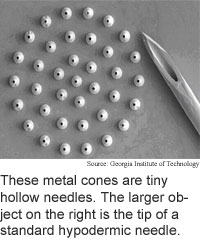
Microneedles give painless shots
The smaller the hypodermic needle, the
less it hurts when it pierces skin.
Researchers from the Georgia Institute of Technology have developed
ways to manufacture solid and hollow metal, silicon, plastic and glass
microneedles that range in size from one millimeter to one thousandth
of a millimeter.
The researchers demonstrated that an array of 400 microneedles
can be used to pierce human skin, and successfully used a similar micro
array to deliver insulin to diabetic rats.
Solid microneedles could eventually be used with drug patches
to increase diffusion rates; hollow needles could eventually be used with
drug patches and timed pumps to deliver drugs at specific times, according
to the researchers.
The hollow needle designs include tapered and beveled tips, and
could eventually be used to deliver microliter quantities of drugs to
very specific locations.
The researchers' method involves etching microneedle masters from
silicon, then using the masters to fabricate micromolds for metal and
polymer needles. They made glass microneedles using conventional drawn-glass
techniques.
Microneedle-based devices could be on the market within five years,
according to the researchers. The work appeared in the November 17, 2003
issue of the Proceedings of the National Academy of Sciences.
Biochip puts it all together
DNA assembles nanotube transistor
Software paraphrases sentences
Chaotic lasers lock messages
Briefs:
Nanotubes detect nerve gas
Microneedles give painless shots
Layers promise cheap storage
Molecule makes two-step switch
Spin material handles heat
Carbon boosts plastic circuits

Research Watch blog
View from the High Ground Q&A
How It Works
RSS Feeds:
News
Ad links:
Buy an ad link
Ad links: Clear History
Buy an ad link
|
TRN
Newswire and Headline Feeds for Web sites
|
© Copyright Technology Research News, LLC 2000-2010. All rights reserved.